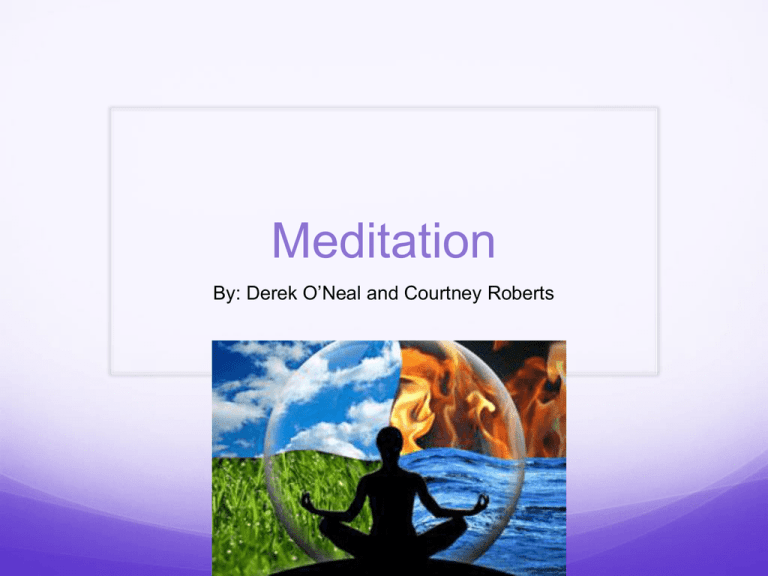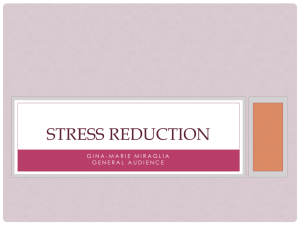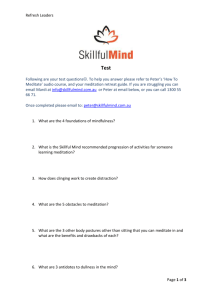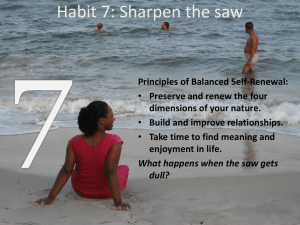Meditation By: Derek O’Neal and Courtney Roberts
advertisement

Meditation By: Derek O’Neal and Courtney Roberts Familiar Meditation Practice and process of paying attention and focusing your awareness Natural Beginning the Meditation Journey Secret of meditation begins with developing, focusing, and directing your awareness Build concentration-block out distractions and focus on awareness Be open to receptive awareness-loosens and extends the mind’s boundaries and embraces every experience that presents itself Use contemplation for greater insight-allows room for freedom and creative expression Cultivate positive, healing states of mind-helps you transform inner life by withdrawing energy from mind-states that are negative or self-defeating Why Meditate? Physiological Benefits Psychological Benefits Decreased heart rate and lower blood pressure More happiness and peace of Quicker recovery from stress Greater enjoyment of the present Decrease in beta and increase in alpha, delta, and gamma brain waves mind moment Less emotional reactivity Enhanced synchronization-correlates with creativity More loving relationships Fewer heart attacks and strokes Increased empathy Increased longevity Enhanced creativity and self- Reduced cholesterol levels Decreased consumption of energy and need for oxygen Deeper, slower breathing and muscle relaxation Reductions in acute and chronic Reduction in the intensity of pain Complement to psychotherapy actualization Heightened perceptual clarity and sensitivity anxiety Why Meditate? Teaches you to slow down and take each moment as it comes; the present moment is all that matters Learn to welcome every experience and facet of your being without judgment Helps you to accept others the way they are and opens up your abilities for a deeper love and intimacy Relaxing the mind relaxes the body Encourages an inner mental spaciousness where concerns no longer seem so threatening Can lead to more happiness and help you focus on the important things in life Enhances work and play performances Increases appreciation, gratitude, and love Discover how to achieve a deeper sense of purpose Helps you feel more centered, grounded, and balanced A Beginner’s Mind Have an open mind to whatever arises Freedom from all expectations and preconceptions Spacious and spontaneous mind Original awareness Innocent, don’t-know spirit Exploring What Motivates You What you bring to it is what you get out of it 1. Improving you life Primary concern is to fix yourself 2. Understanding and accepting yourself Developing self-awareness and self-acceptance 3. Realizing your true nature Finding your identity 4. Awakening others See others as no different from yourself and put their needs before your own 5. Expressing your innate perfection Express your “true nature”; confidence in the peace and happiness you already have Living in Harmony Be mindful of cause and effect Reflect on impermanence and the preciousness of life Realize the limitations of worldly success Practice nonattachment Cultivate patience and perseverance Simplify your life Live with honesty and integrity Face situations with the courage of a warrior Trust the technology of meditation Dedicate your practice to the benefit of others How the Mind Stresses You Out Preoccupation with past and future Resistance to the way things are A judging and comparing mind Learned helplessness and pessimism Overwhelming emotions Fixation of attention Clinging to a separate self How Meditation Relieves Stress Develops focus and meditation Stabilizes concentration, returns to the present moment, cultivates positive emotions Allows spontaneous release Negative thoughts and feelings naturally disappear Penetrates your experience with insight Become aware of your inner experience, become aware of your story and how it confused you, change your story, see beyond your story to who you really are, free yourself from your story Becoming Aware of the Here and Now Turn attention inward Relax your body Develop mindfulness Moment-to-moment awareness of your experiences as they occur Focus on your breath Expand to sensations Welcome whatever arises Control your wandering mind Meditation Poses Kneeling Half Lotus Quarter Lotus Full Lotus The Practical Stuff What to wear: choose comfort over fashion When to meditate: any time is the best time How long to meditate: anywhere from 5 minutes to an hour; it’s up to you! Where to meditate: create a sacred space Avoid the busy spots in your house, stay away from areas of work, find a quiet place that is not too dark or too light, and is close to nature and fresh air Meditate in the same place each time Fewer distractions, good vibes, peaceful memories Can meditate while doing dishes, at the computer, driving, talking on the phone, watching TV, working out Before you meditate… Eat lightly or wait an hour after a big meal and avoid mind-altering substances Just Do It Practice meditation again and again Make and keep a commitment to yourself Be consistent Restrain yourself Give 100% of your energy Apply yourself earnestly Make an effortless effort Suspend judgment and be accepting Let go, unmask, and surrender yourself Factors that Close Our Hearts Fear of being attacked, criticized, manipulated, or overwhelmed Resentment-bitterness builds up Unresolved grief-constantly mulling over your losses Jealousy-label self as inferior Pain Grasping and attachment- fear of losing what you’re attached to Self-clinging leads to separation from others Opening Your Heart Benefits of love: energy, peace, well-being, good health, belonging, interconnectedness, and spiritual awakening The factors of a happy and fulfilling life 1. Lovingkindness: feeling of goodwill toward all 2. Compassion: feel others’ suffering and want to help 3. Sympathetic Joy: happy feelings that arise in response to the happiness of others 4. Equanimity: don’t allow what happened to you upset you Generate compassion Common Roadblocks to Meditation Sleepiness Restlessness Boredom Fear Doubt Procrastination Self-judgment Attachment and desire Pride Avoidance Bypassing Develop a Practice That Works For You Know your motivation Play to your strengths and fill in the gaps Experiment, trust intuition, and then settle down Create a regular practice Meditate with others-join or form a group Attend a workshop or retreat Being Happy with Meditation Happier people: more energetic, generous, better-liked, selfconfident, more likely to have fulfilling relationships, more effective at work, have stronger immune systems Accept what life brings Feel and express gratitude for the good things in life Savor the pleasures life offers Dwell as much as possible in the present moment Don’t let the inevitable ups and downs disturb their equanimity Savor the moment Foster flow Develop gratitude Learn to forgive Cultivate optimism Using Meditation for Healing Healing=returning to an intrinsic state of wholeness Ways meditation works: Love and connectedness, relief of tension and stress, restore alignment and balance, opening and softening, creating space for emotions, harmony and joy, freedom from self-clinging, awakening Increased focus, minimal distractions, free from expectations, enhanced clarity, greater endurance, flow experience, capacity to see things multidimensionally, self-acceptance, compassion Types of Meditations Practicing relaxation Find a quiet & undisturbed spot, sit in a comfortable position, choose an object to concentrate on, maintain a receptive attitude Practicing a half smile Form lips into a half smile, hold this for at least 10 minutes while doing an ordinary activity, practice this the next time you feel your spirits sagging Walking meditation Walk at usual pace while following breath, coordinate breathing with walking, be aware of feet and legs as you move them, enjoy mindful walking for as long as you want Peaceful place Sit comfortably, close eyes, take a few breaths, imagine yourself in a safe and protected place, take your time, allow yourself to rest in feelings of comfort, safety & tranquility, spend as much time as you want here




